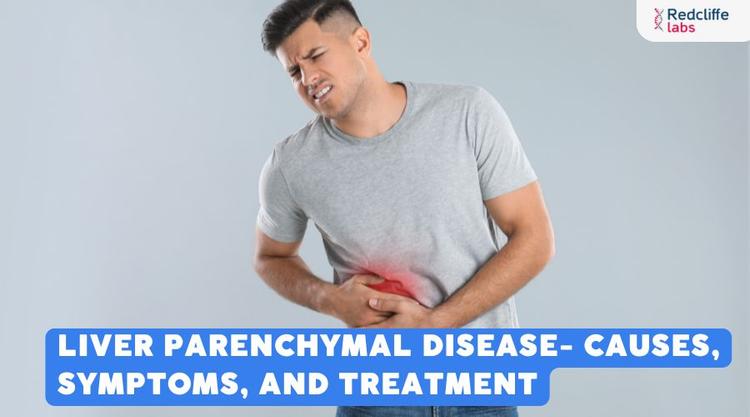What Is Fatty Liver? Causes, Symptoms, And Treatment?

Medically Reviewed By
Dr Divya Rohra
Written By Komal Daryani
on May 9, 2022
Last Edit Made By Komal Daryani
on Jan 10, 2025

Fatty liver is one of the common disorders of liver disease. About 2 million people die per year overworld from liver disease. In this condition, there is extra storage of fat over the liver. At first, there are usually no symptoms, but in rare cases, liver damage can occur. But, the good thing is that this liver disease is managed by lifestyle prevention and changes.
What Is Fatty Liver?
The liver is the second largest organ of your body and helps you digest food, convert nutrients into energy, and remove poisons from the body. In fatty liver, also called hepatic steatosis, the extra layer of fat collects on your liver. With time, these fatty deposits on the liver can damage your liver tissue, causing inflammation and scarring that in turn leads to cirrhosis of the liver.
What Are The Forms Of Fatty Liver?
Predominantly, a person with a heavy drinking alcohol habit is more susceptible to getting fatty liver disease. But some people who don't drink a lot of alcohol can have this disease too.
Therefore there are two forms of fatty liver;
- Nonalcoholic Fatty Liver Disease (NAFLD): In recent studies, it is termed as a growing epidemic worldwide due to the increase in cases of diabetes and obesity. Numerous risk factors can lead to non-alcoholic fatty liver, which can increase the risk of liver failure and some heart conditions.
- Alcohol-Related Fatty Liver Disease (ARFLD): Excessive alcohol consumption for a long time produces a wide range of liver diseases as the liver sustains the greatest injury due to heaving drinking and the fatty liver is the earliest response to it.
What Causes Fatty Liver Disease?
The exact cause of fatty liver is not known, but several factors might contribute to it.
Some of them are:
- Metabolic Diseases- Metabolic diseases like diabetes, increased cholesterol level, hypertension affect the liver and may lead to fatty liver.
- Diet- A diet specifically rich in fats is an independent causative factor of the non-alcoholic fatty liver. As the liver cannot break down fat, extra fat can build up on the liver, where it acquires and causes fatty liver disease.
- Smoking And Tobacco Consumption
- Lifestyle- An inactive, sedentary lifestyle can lead to insulin resistance and high cholesterol, which has negative effects on the liver.
- Polycystic Ovarian Syndrome- Polycystic ovarian syndrome is a common endocrine disorder with typical obesity and increased insulin resistance that contributes to fatty liver.
- Excessive Alcohol Usage- Alcohol is metabolized by the liver, subsequently damages liver tissue most, resulting in fatty liver, liver failure, and other conditions.
- Hepatitis And Other Viruses: Hepatitis A, Hepatitis B, Hepatitis E, and other virus-like herpes simplex virus can cause several liver issues.
- Genetics Issues: Some people may not have any pre-existing conditions for fatty liver disease but many genetic changes in the body can be a reason for this condition.
What Are The Symptoms Of Fatty Liver?
There are no specific symptoms of fatty liver. However, you may feel tired, discomfort, and pain in the right abdomen. When fatty liver is long-lasting and leads to cirrhosis of the liver, it shows some symptoms, including:- Lack of appetite
- Weight loss
- Jaundice
- Abdominal swelling
- Red palms
- Weakness
- Fatigue
- Bloody vomiting
What Are The Risk Factors For Fatty Liver?
There are many risks of fatty liver and other liver conditions. Some of the major threats include the following:- Alcohol Abuse: If you are a heavy drinker, it may cause severe problems to the liver due to its metabolism.
- Diabetes: If you have diabetes, then your body does not produce enough insulin, which increases your risk of developing fatty liver disease.
- High Blood Cholesterol: If you are eating a fat-rich diet and don't have any physical activity it may increase your blood cholesterol which directly puts you at the risk of fatty liver.
- Obesity: Being overweight and having high belly fat may increase the risk of fatty liver disease.
How To Diagnose Fatty Liver?
The diagnosis can be a little tricky because the fatty liver does not have any symptoms in most cases. The best way to diagnose fatty liver is through blood tests, imaging tests, and biopsy too.
Here are some major types of tests used in the diagnosis of fatty liver disease:
- Blood Tests: your doctor will prescribe a blood test to diagnose your fatty liver disease condition
Some major blood tests help in diagnosis:
Some of the imaging tests are:
- Liver Function Test (LFT): This helps to find your liver's functionality levels. It helps to diagnose and monitor liver disease or damage. It is a major health-regulatory blood test essential to find out the efficacy and normalcy of the liver.
- Liver Enzyme Tests: They help in determining liver disease. If there is an expected increment in liver enzymes.
- Lipid Profile Test : These tests measure levels of blood fats in the body, such as cholesterol, high-density lipoprotein (good cholesterol), low-density lipoprotein (bad cholesterol), Triglycerides to rule out the causative factor of fatty liver.
- Chronic Viral Hepatitis Tests: tests like hepatitis A and hepatitis C may also help in the diagnosis of fatty liver disease.
- There are some routine tests like CBC, blood sugar fasting to diagnose any other underlying disease.
- Imaging Tests: Imaging tests can uncover extra fats in your liver and help in the final diagnosis of fatty liver.
- Ultrasound Or Sonography: It is a diagnostic imaging method that utilizes waves to produce images of the body's structure. It is the initial test when any liver disease is suspected.
- Computerized Tomography (CT) Scan: In this imaging test, a variety of x-ray and computer technology to create images of the liver.
- Magnetic Resonance Imaging (MRI): Radio waves and magnets are used to produce detailed images of the structure in the body.
- Liver Biopsy: It is the test that can verify a diagnosis of fatty liver disease. This diagnosis shows how terrible the disease is. Your Doctor only advises the liver biopsy if you are suffering from severe symptoms to study the signs of damage or disease.
What Is The Complication Of Fatty Liver?
There is a wide range of complications of fatty liver as the liver stops functioning.Some major complicated issues are included here:
- Cirrhosis: When your liver is severely damaged by fatty liver tissue, the scar tissue slows down the liver’s functioning. Ultimately, the function of the liver stops completely and leads to cirrhosis of the liver.
- Inflammation: With each progressive stage of the fatty liver, slowly damages the tissues of the liver and leads to the inflammation of the liver.
- Ascites: This is the major issue where a collection of fluid in the abdomen affects liver issues.
- Liver Failure: As fatty liver disease progresses, it may lead to liver failure.
How Can We Prevent Fatty Liver?
Fatty liver is somehow a preventable disease. It is possible to prevent and manage fatty liver by changing diet and some lifestyles.
Here you can read some most preferable preventions:
- Limit the use of alcohol to decrease the risk of fatty liver or any liver disease.
- Maintain a healthful weight as being over or low can cause several metabolic issues which can contribute to the fatty liver.
- Regular exercise can help prevent metabolic disorders, maintain cholesterol levels, and decrease the risk of fatty liver.
- A healthy diet is a key factor to reduce the risk.
- Take a proper and regular health check-up
What Is The Management Of Fatty Liver?
The best management of liver disease is self-care or prevention. Still, no medication is proven for fatty liver disease. But, if you have complicated fatty liver issues like Cirrhosis.
Your doctor might prescribe you:
- Some medications like lipid-lowering drugs, antioxidants, insulin-sensitizing drugs, etc.
- As the fatty liver progresses it can lead to cirrhosis of the liver and liver failure, in which the last treatment option is a liver transplant.
What Can We Do To Help You Deal With Fatty Liver?
Redcliffe Labs provides you with all the diagnostic tests needed for fatty liver. All the required tests like the Liver Function Test in Delhi, and Lipid Profile Test are available with Redcliffe Labs to rule out fatty liver. We provide you with a Liver Function Test with free sample collection from your home, fast lab results, and our 24 * 7 patient help desk to get the test conveniently.
Conclusion:
Fatty liver with its progressive nature can cause severe problems to your liver. It can cause liver cell scarring as well as liver failure, both of which are difficult to treat at later stages. So it is important to take notice and to take care of your health at a very early stage.Disclaimer: The blog content has been posted as a piece of information and awareness only. The content provided in this blog, or in any linked materials, is not proposed and should not be taken as medical advice. Redcliffe Labs strongly recommends users consult with their healthcare providers to make any medical or health-related decision.



